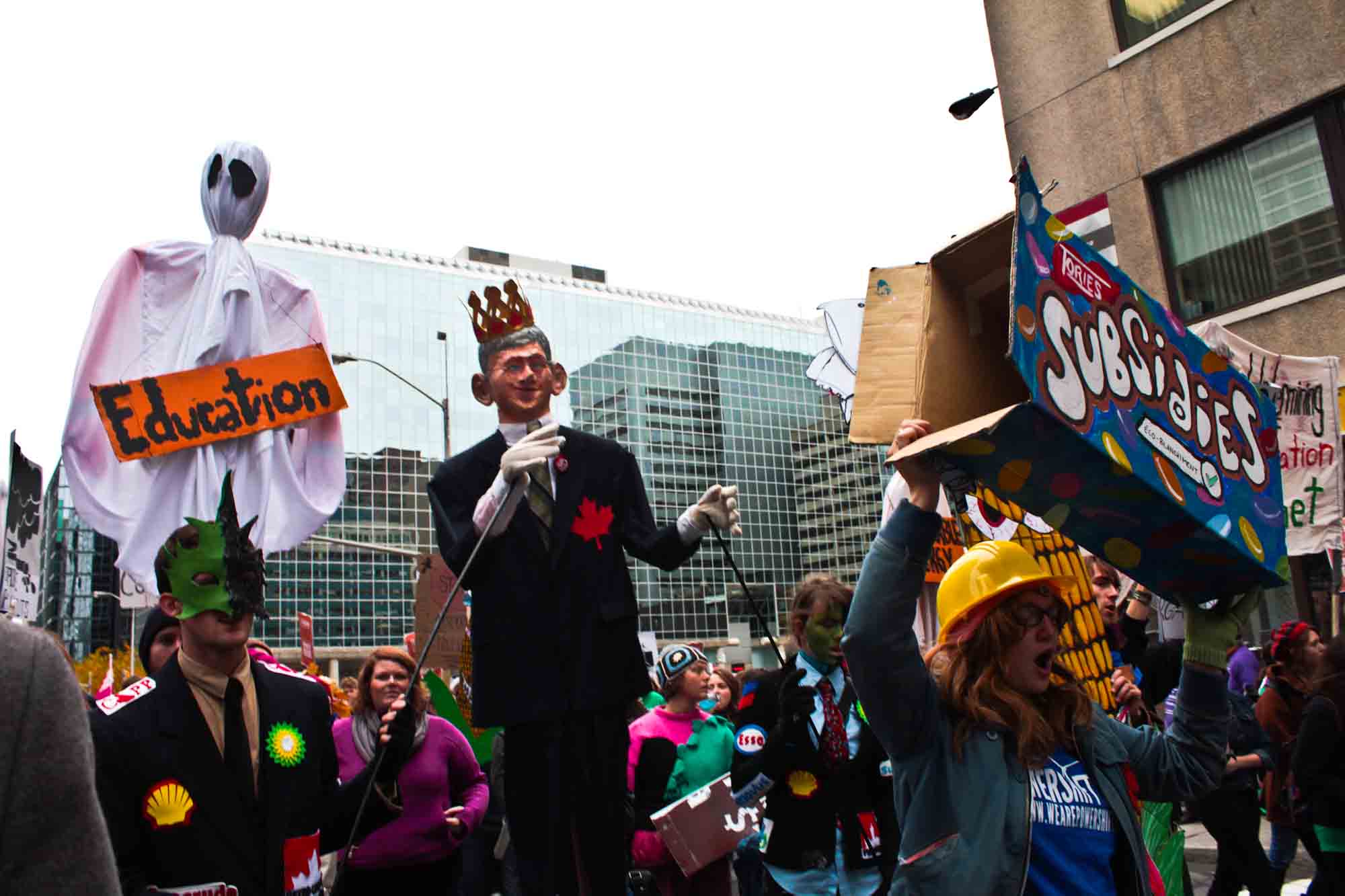PowerShift Galvanizes Climate Justice Organizing
PowerShift Galvanizes Climate Justice Organizing

OTTAWA—As the "Frankenstorm" hit North America, hundreds of youth from across Canada marched through the streets of Ottawa on Monday, October 29, 2012, demanding the Canadian government take action against the fossil fuel corporations that are responsible for fueling climate change and climate change-induced extreme weather.
Around 400 people held a "Toxic Trick or Treat" march that started on Parliament Hill, visited a McDonald's fast food chain and several government and industry offices and demanded the federal government keep its promise to end the 1.4 billion dollars a year in subsidies to fossil fuel corporations and transition to a clean energy economy.
The “Toxic Trick or Treat” march featured a puppet of Prime Minister Stephen Harper wearing Queen Elizabeth II’s crown, an Exxon Mobil CEO, a theatrical die-in and climate chaos-themed Halloween costumes such as ghosts of Canada’s social and environmental regulations’ past, corporate zombies, "frack"ensteins, GMO corn monsters, green jobs ghostbusters, offshore drilling vampires and gravestones for the public sector cuts and environmental devastation.
The march was the culmination of PowerShift 2012, a weekend-long conference attended by a thousand youth from across Canada and the US demanding more just solutions to the climate and economic crisis. The Conservative Canadian government of Stephen Harper recently withdrew from the Kyoto Accord, scrapped environmental legislation at home and is accused of “muzzling” scientists and the press and even deleting the word “environment” from government websites.
"Climate change is loading the dice for extreme weather events like Hurricane Sandy," says Melisa Larue, a spokesperson for PowerShift. "Meanwhile the federal government continues to give multi-billion dollar handouts to wealthy fossil fuel corporations who are not only responsible for driving climate change but are blocking the clean energy solutions that could solve the crisis."
The world's leading climate scientist James Hansen has shown that because of climate change the frequency of intense weather like extremely hot events have risen by 50 times compared to the decades before 1980.
First Nations communities are on the frontline of the tar sands and other fossil fuel-intensive industries that devastate their traditional unceded territory causing high rates of cancer and other illnesses in their communities.
"Climate and environmental disasters hit Indigenous peoples and poor people first and the worst," says Vanessa Gray, a 20-year-old from the Aamjiwnaang First Nation in Ontario near the Sarnia petro-chemical industry, who participated in a symbolic die-in in front of the Prime Minister's Office with youth from other First Nations. "The federal government needs to respect Indigenous rights. Its unconditional support for polluting corporations has lethal consequences for Indigenous communities, whether we're downstream of the tar sands in Alberta or downwind of Southern Ontario's Chemical Valley."
Best-selling author Naomi Klein attended the conference with her husband Avi Lewis and their four-month-old boy Toma, who she described as “an act of faith.” Her keynote speech centred around the Guardian’s expose of the world's largest geo-engineering experiment off the West Coast of Canada earlier this month. “How did we end up here that it somehow seemed more reasonable to change the colour of the sky and the chemical composition of the ocean than to ask someone to take the bus? How did that become reasonable?” asked Klein.
Her upcoming book and Lewis’ upcoming film will look at the relationship between capitalism and climate change and how the world’s emissions-heavy economic model is “at war with the life support systems on earth.”
“Climate change is not in itself the crisis, it’s the symptom of a broader crisis that has to do with an economic model that’s built on endless growth and the idea that we can have infinite consumption on a finite planet,” said Klein.
Klein points out that strong public infrastructure and a move away from corporate globalization and free trade are essential to both reducing carbon emissions and to surviving extreme weather. Many of the solutions to climate change are what social justice and anti-austerity movements have been demanding for years.
Author, environmentalist and co-founder of 350.org, Bill McKibben also attended PowerShift and called the fossil fuels corporations a “rogue industry.”
“They are outlaws, not against the laws of the state—they get to write those too often—but against the laws of physics.”
“If you are willing to get up in the morning and amass a fortune by altering the chemical composition of the atmosphere, you are engaged in a more radical act than any human being before you,” said McKibben.
McKibben’s 350.org is launching a twenty city-tour modeled on the South African anti-apartheid movement called “Do the math,” in order to pressure universities to divest from their holdings in the fossil fuels industry.
The most recognized face of the Quebec student movement, Gabriel Nadeau-Dubois, former co-spokesperson for the student association CLASSE—which successfully froze a tuition hike after a seven-month-long student strike—gave the opening keynote, calling for social justice and environmental movements to work together in tackling climate change.
“I believe I can say it is now possible to spend one's life consuming in an entirely 'green' and responsible manner. Isn’t this a thing of wonder? And yet, the destruction of our world continues and even accelerates.”
He warned that individual gestures can be counterproductive as they merely “allow people to be at peace with themselves” while condemning the lifestyle of the working class.
“While blaming each other and comparing our daily level of ecological purity, we have forgotten that the heart of the problem is not at the level of consumption, but in the very infrastructure of our economic system, it resides at the level of production.” He said that “sustainable growth does not and cannot exist” on a planet with limited resources.
“We know the cause: it has no face, no employment, it’s not a man nor a woman; it’s a structure, a worldview, an idea, a reality, an economic system with a name and we must stop being afraid to call it by its name. It’s called capitalism.”

